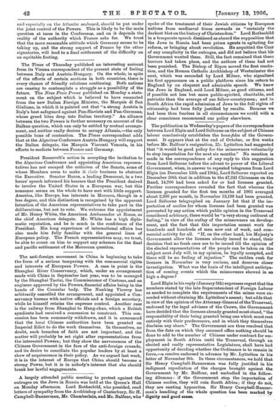A largely attended public meeting to protest against the outrages
on the Jews in Russia was held at the Queen's Hall on Monday afternoon. Lord Rothschild, who presided, read letters of sympathy from the Archbishop of Canterbury, Sir H. Campbell-Bannerman, Mr. Chamberlain, and Mr. Balfour, who spoke of the treatment of their Jewish citizens by European nations from mediaeval times onwards as "certainly the darkest blot on the history of Christendom." Lord Rothschild in a temperate speech disnlissed as absurd the supposition that the Jews in Russia had been prime agents in agitating for reform, or bringing about revolution. He acquitted the Czar of any complicity in the outrages, and did not believe that his Government wanted them. Still, the fact remained that these horrors had taken place, and the authors of them had not been punished. The Bishop of Ripon moved the first resolu- tion, and the Roman Catholic Archbishop of Westminster the next, which was seconded by Lord Milner, who signalised his first appearance on a public platform since his return to England by an eloquent and admirable speech. We knew the Jews in England, said Lord Milner, as good citizens, and if possible not less but more public-spirited, charitable, and patriotic than the average of our fellow-countrymen; and in South Africa the rapid admission of Jews to the full rights of citizenship had been fully justified by results. Because we had been thus fearless in all circumstances we could with a clear conscience recommend our policy elsewhere.










































 Previous page
Previous page